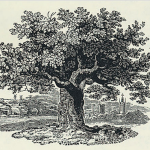The Good Old People Could Identify Her and Tell of Her Doings
She Rode on a Broomstick
by Egbert T. Bush, Stockton, N.J.
published in the Hunterdon County Democrat, May 1, 1930
The Good Old People Could Identify Her and Tell of Her Doings
She Rode on a Broomstick
by Egbert T. Bush, Stockton, N.J.
published in the Hunterdon County Democrat, May 1, 1930
Feeding Fifty Men Was Not Uncommon on Such an Occasion
Eatables in Great Abundance
by Egbert T. Bush, Stockton, N.J.
originally published by the Hunterdon Co. Democrat, July 24, 1930
Note: I have included the punctuation as it appeared in the original article, even though I disagree with the editor’s use of commas, and wonder if that was how Mr. Bush wrote it. Also, when Mr. Bush refers to “the young generation,” he means people born in the late-19th and early 20th-century. Mr. Bush was born in 1848.
Processes of Lining, Scoring, Boring and Hewing Described
‘The Big Thrashing Floor’
by Egbert T. Bush, Stockton, N. J.
published in the Hunterdon County Democrat, July 17, 1930
There is no genealogy in this article; it is simply about how to build a barn.
Recently I wrote about the diary of Benjamin H. Ellicott, a Baltimore man who married into a Hunterdon family, and traveled with his family from Baltimore to Flemington in 1861.1
First Trip to Delaware River Kilns an Experience for a Boy
Spoke Making a Lost Trade
by Egbert T. Bush, Stockton, N. J.
published in the Hunterdon Co. Democrat, April 21, 1932
 In recognition of the belated arrival of spring, I offer Mr. Bush’s tale of how farmers got lime for their fields in the mid 19th-century. And among those “Other Things,” Mr. Bush describes the business of spoke making.
In recognition of the belated arrival of spring, I offer Mr. Bush’s tale of how farmers got lime for their fields in the mid 19th-century. And among those “Other Things,” Mr. Bush describes the business of spoke making.
As our forests were cut off and the stumps rotted away, the land was found to be or soon to become more or less sour. The sorrels began to grow plentifully, especially the tall, reddish brown one that we called “horse sorrel.” That was later known as a sure indication that the land needed lime, tho in the earlier stages little was known about sour land or the indications, or even about lime as a sweetener. Such knowledge, like almost every other kind, grew gradually with experience and observation, until science took hold of such matters and showed us to be sometimes on the right track without knowing exactly why.
by Egbert T. Bush, Stockton, N.J.
published by the Hunterdon Co. Democrat, November 21, 1929
This is another in a series of articles by Egbert T. Bush Paying attention to the wonderful trees of old Hunterdon County. A complete list of Bush’s tree articles can be found at the end.
by Egbert T. Bush, Stockton, N. J.
published in the Hunterdon County Democrat, February 23, 1933
Comment: Unlike my usual practice, I have nothing to add to this very contemplative article. A passing knowledge of scripture and of the writings of Ralph Waldo Emerson would be helpful. It is interesting that Bush combines the subjects of sausage making and paying taxes. There’s an echo here of the common association of sausage making with passing laws, from whence we get the burden of taxation. Bush’s thoughts on this subject are well worth contemplating, in particular his opinion that those who complain the most about their taxes should think about what they demand of government.
Passenger Pigeons Once Were Slaughtered By Millions
The Species Is Now Extinct
by Egbert T. Bush, Stockton, NJ
as published in the Hunterdon County Democrat, April 17, 1930
For the stories of the wildwood
Of the mountain and the plain
(Any stories heard in childhood)
Are the stories that remain.Yes, the stories that were told us seventy years ago still come up in quiet hours to rouse the drowsy mind and stir the sluggish blood. Some scattering ones that do not seem to fit well in any particular place may recall fond memories in older people; and may be of more or less interest now and then to one of the younger generation, not for themselves but as inklings of the older times. Present conditions are not calculated to make them as vivid as when memory recorded them so long ago; yet perhaps enough may be depicted, even by a limping pen, to give a fair idea of things then made so clear, often quite thrilling and always interesting.
Great Catches of Shad in the Delaware River Were Common
Heavy Snow of 1874
by Egbert T. Bush, Stockton, NJ, April 24, 1930
Note: These observations by Mr. Bush on the blizzard of 1874 seemed especially appropriate for this time of year.